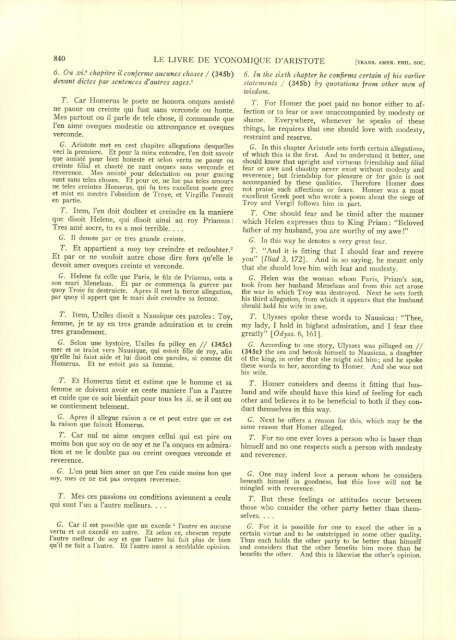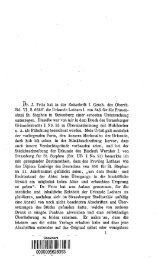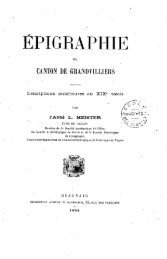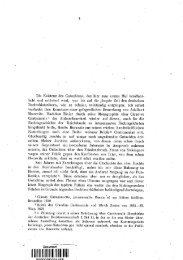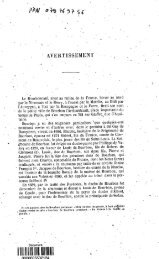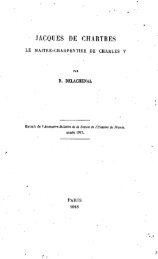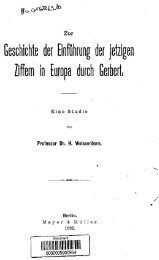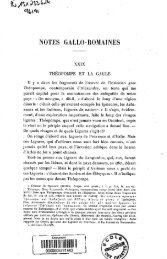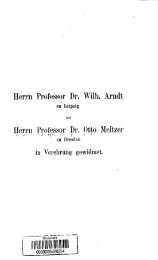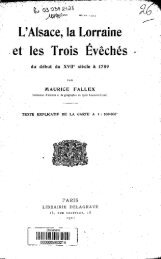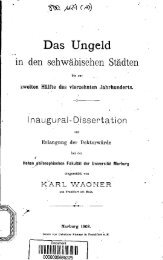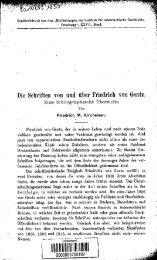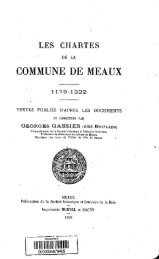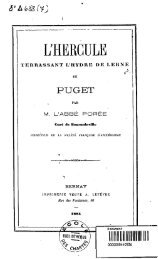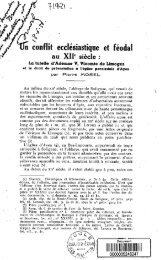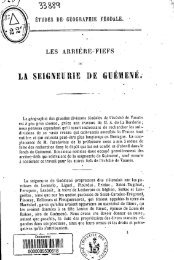4P Li gç(' TRANSACTIONS
4P Li gç(' TRANSACTIONS
4P Li gç(' TRANSACTIONS
You also want an ePaper? Increase the reach of your titles
YUMPU automatically turns print PDFs into web optimized ePapers that Google loves.
840 LE LIVRE DE YCONOMIQUE D'ARISTOTE [TRANS. AMER. PHIL. SOC.<br />
6. O lt .vi.e chapifre ii confernie aucunes choses / ( 345b)<br />
devant dictes par sentences d'aufres sages.'<br />
T. Car Homerus le poete ne honora oriques amisté<br />
ne paour ou creinte qui fust sans verconde on home.<br />
Mes partout ou ii pane de tele chose, ii commande que<br />
l'en aime oveques modestie ou attrempance et oveques<br />
verconde.<br />
G. Aristote met en cest chapitre allegations desquelles<br />
veci la premiere. Et pour La niiex entendre, l'en doit savoir<br />
que amisté pour bieri honeste et selon vertu ne paour ou<br />
creinte filial et chaste ne sunt onques sans verconde et<br />
reverence. Ales amisté pour delectation ou pour guaing<br />
sunt sans teles choses. Et pour cc, ne be pas teles amours<br />
ne teles creintes Humerus, qui fit tres excellent poete grec<br />
et mist en mectre lobsidion de Troye. et Virgule l'ensuit<br />
en partie.<br />
T. Item, l'en doit doubter et creindre en la maniere<br />
que disoit Helene, qui disoit ainsi au roy Prianius:<br />
Tres amé socre, tu es a moi terrible.<br />
G. II denote par cc tres grande creinte.<br />
T. Et appartient a moy toy creindre et redoubter.2<br />
Et par cc tie vouloit autre chose (lire fors qu'elle Ic<br />
devoit amer oveques creinte et verconde.<br />
G. Helene fu celle que Paris, le fllz de Priamus, osta a<br />
son mari Menelaus. Et par ce commença la guerre par<br />
quoy Troie fu destruicte. Apt-es ii met la tierce allegation,<br />
par quoy il appert que Ic niari doit creindre sa femme.<br />
T. Item, Uxiles clisoit a Nausique ces paroles: Toy,<br />
femme, je te ay en tres grande admiration et te crein<br />
tres grandement.<br />
C. ScIon uric hystoire, Uxiles fir pilley en // (345c)<br />
men et se traist vers Nausique, qui estoit flue de roy, afin<br />
qu'elle liii faist aide et lui disoit ces paroles, si comme dit<br />
Hornerus. Et ne estoit pas sa femme.<br />
T. Et Hotnerus tient et estime que be homme et sa<br />
femme se doivent avoir en ceste maniere l'un a l'autre<br />
et cuide que cc soit bienfait pour tous les .ii, se il ont Ott<br />
se contiennent telement.<br />
C. Apres ii allegue raison a cc et peut estre que cc est<br />
Ia raison que faisoit Homerus.<br />
T. Car nul ne aime onques cellui qui est pire ou<br />
nioins ban que soy ou de soy et ne l'a onques en admiration<br />
et ne be doubte pas ou creint oveques verconde et<br />
reverence.<br />
C. L'en peut bien amer un que l'en cuide moms bon que<br />
soy, nies cc ne est pas oveques reverence.<br />
T. Mes ces passions ou conditions aviennent a ceulz<br />
qui sunt l'un a l'autre melleurs.<br />
C. Car il est possible que un excede ' l'autre en aucune<br />
vertu et est excedé en autre. Et selon cc, chescun repute<br />
l'autre melleur de soy et que lautre lui fait plus de hien<br />
quiL ne fait a lautre. Et Fautre aussi a semblable opinion.<br />
6. In the sixth chapter he confirms certain of his earlier<br />
statements / ( 345b) by quotations from other men of<br />
wisdom.<br />
T. For homer the poet paid no honor either to affection<br />
or to fear or awe unaccompanied by modesty or<br />
shame. Everywhere, whenever he speaks of these<br />
things, he requires that one should love with modesty,<br />
restraint and reserve.<br />
C. In this chapter Aristotle sets forth certain allegations,<br />
of which this is the first. And to understand it better, one<br />
should know that upright and virtuous friendship and filial<br />
fear or awe and chastity never exist without modesty and<br />
reverence; but friendship for pleasure or for gain is not<br />
accompanied by these qualities. Therefore Homer does<br />
not praise such affections or fears. Homer was a most<br />
excellent Greek poet who wrote a poem about the siege of<br />
Troy and Vergil follows him in part.<br />
T. One should fear and be timid after the manner<br />
which Helen expresses thus to King Priam: "Beloved<br />
father of my husband, you are worthy of my awe!"<br />
C. In this way be denotes a very great fear.<br />
T. "And it is fitting that I should fear and revere<br />
you" [Iliad 3, 172]. And in so saying, he meant only<br />
that she should love him with fear and modesty.<br />
C. Helen was the woman whom Paris, Priam's son,<br />
took from her husband Menelaus and from this act arose<br />
the war in which Troy was destroyed. Next he sets forth<br />
his third allegation, from which it appears that the husband<br />
should hold his wife in awe.<br />
T. Ulysses spoke these words to Nausicaa: "Thee,<br />
my lady, I hold in highest admiration, and I fear thee<br />
greatly" [Odyss. 6, 1611.<br />
C. According to one story, Ulysses was pillaged on<br />
(3450 the sea and betook himself to Nausicaa, a daughter<br />
of the king, in order that she might aid him; and he spoke<br />
these words to her, according to Homer. And she was not<br />
his wife.<br />
T. Homer considers and deems it fitting that husband<br />
and wife should have this kind of feeling for each<br />
other and believes it to be beneficial to both if they conduct<br />
themselves in this way.<br />
G. Next he offers a reason for this, which may be the<br />
same reason that Homer alleged.<br />
T. For no one ever loves a person who is baser than<br />
himself and no one respects such a person with modesty<br />
and reverence.<br />
G. One may indeed love a person whom he considers<br />
beneath himself in goodness, but this love will not be<br />
mingled with reverence.<br />
T. But these feelings or attitudes occur between<br />
those who consider the other party better than themseLves.<br />
C. For it is possible for one to excel the other in a<br />
certain virtue and to be outstripped in some other quality.<br />
Thus each holds the other party to be better than himself<br />
and considers that the other benefits him more than he<br />
benefits the other. And this is likewise the other's opinion.


